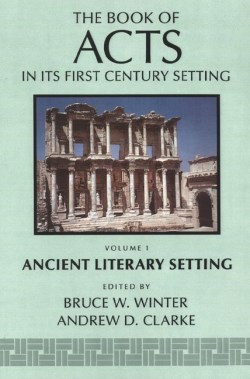Andrew Clarke
Showing the single result
-
Ancient Literary Setting
$54.99This Prodigious New Six-Volume series presents the results of interdisciplinary research between New Testament, Jewish, and classical scholarship. Working to place the Book of Acts within its first-century setting, well-known historians and biblical scholars from Australia, the United States, Canada, Russia, and the United Kingdom have collaborated here to provide a stimulating new study that replaces The Beginnings of Christianity and other older studies on Acts. Starting with the understanding that the Book of Acts is rooted within the setting of the peoples and cultures of the Mediterranean in the first century A.D., this comprehensive series provides a multifaceted approach to the Acts of the Apostles in its literary, regional, cultural, ideological, and theological contexts. The composition of Acts is discussed beside the writing of ancient literary monographs and intellectual biographies. Recent epigraphic and papyrological discoveries also help illumine the text of Acts. Archaeological fieldwork, especially in Greece and Asia Minor, has yielded valuable information about the local setting of Acts and the religious life of urban communities in the Roman Empire. These volumes draw on the best of this research to elucidate the Book of Acts against the background of activity in which early Christianity was born. The Book of Acts in Its Ancient Literary Setting is the first volume in this groundbreaking series. The book includes fourteen chapters devoted to the literary framework that undergirds the Book of Acts. Topics include the text as an historical monograph, ancient rhetoric and speeches, the Pauline corpus, biblical history, subsequent ecclesiastical histories, and modernliterary method. All of these chapters arise out of a consultation by the project’s scholars at Cambridge in March 1993.
Add to cartin stock within 3-5 days of online purchase











